Introduction
This series might make me sound like a bit of a “know-it-all”. Hopefully this topic will restore some perspective and help someone avoid making the same mistakes I have made.
We all make mistakes, so long as we learn from them, they’re not so embarrassing. They can be tremendously beneficial.
“I pride myself on never making the same mistake more than… half a dozen times”
Mistake 1 – never sell
This was probably my biggest mistake. It put me on the edge of bankruptcy. All the experts whose advice I’d swallowed when I was a noob said you should buy and never sell. Following this advice, I had accumulated 16 investment properties. And then the GFC hit.
The problem is I took my eye off the markets I had invested in. I was always looking forward, aiming for the next purchase. Some of the markets I’d bought in, had dramatic capital growth. But as with many tremendous booms, they’re often followed by busts.
There was no bust bigger than the GFC. Almost every property I owned went backwards. If I had been well-prepared, I could have weathered the storm. But I would have been much better off selling rather than weathering. There’s another presentation on that exact topic. Check it out here…
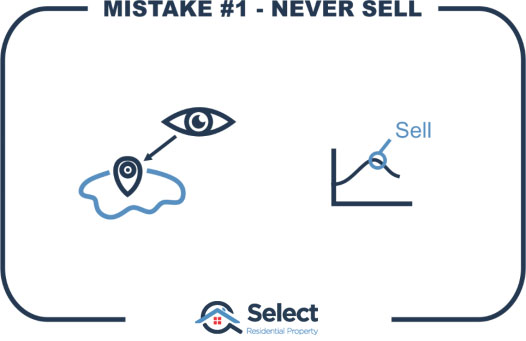
Mistake 2 – too few refinance options
I’d sought out the best finance for my unique ownership structure and my specific employment situation. That meant borrowing funds from alternate lenders who were prepared to look at non-standard cases.
My mistake here was I was too reliant on highly specialised and unique finance. Because the source of their funds wasn’t from deposit-taking institutions, some even came from offshore, the interest rates went up dramatically during the GFC. I had one mortgage climb to over 11%.
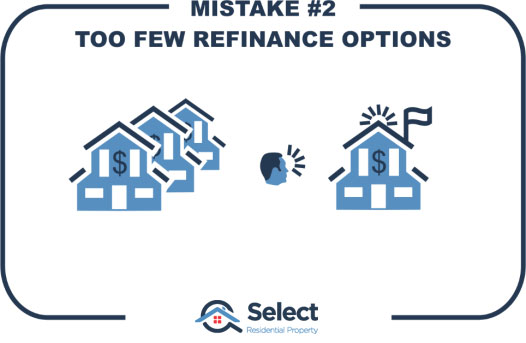
I couldn’t refinance at that time because every lender was scared. So, I had no option but to sell – at the worst possible time, when prices were low.
“Pick a loan you can easily replace if your lender turns ugly”
Mistake 3 –fancy finance
I made another mistake with fancy finance. I negotiated a deal with the seller of a property. They would effectively lend me the deposit. It’s called vendor finance. But I had another lender from which I borrowed 80% of the value of the property and the vendor would lend me the remaining 20%. All I had to pay was stamp duty and legal fees. Massive leverage.
Assume there are 400 renters in a suburb and 600 owner-occupiers. In this case, there would be 1,000 residents in the suburb and 40% of them would be renters.
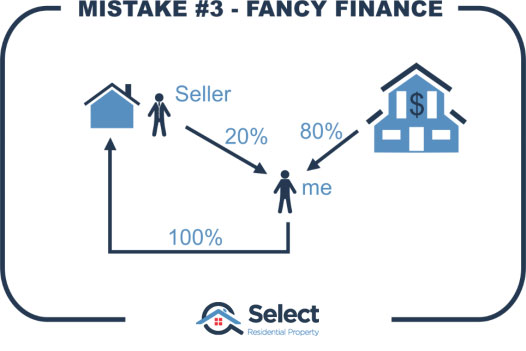
I calculated that I only needed 4% growth for this property to deliver about a 100% return on investment every year. What suburb is only going to grow at 4% – easy right? It went backwards by 14%. I got lazy in my research. I thought the cleverness was all in the finance.
“Finance is how you leverage more out of a good investment or dig a deeper grave”
Mistake 4 – not researching the tenant
The first property I bought already had a tenant. I researched the property well enough, but not the tenant.
The previous owner self-managed the property. The tenant was a nightmare. They never paid a single dollar in rent. They played every trick with the tenancy board to delay their eviction. I think they’ve done this before, like pros.
It took nearly 6 months to get them out. They moved out just before the sheriff was called.
They were so angry about being evicted; they blocked the drains up and left taps running overnight to flood the house.
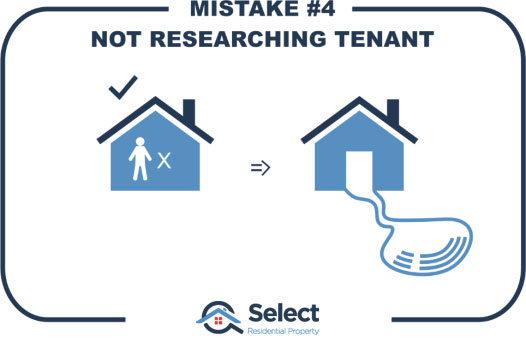
“Don’t forget to research the tenant if your investment property comes with one already fitted”
Mistake 5 – buying overseas
I bought property in New Zealand and I tried in the USA just before the GFC. It was hard to get access to relevant information for those markets.
I was taking a big risk buying in property markets I realise now I knew very little about. Not only are the laws different, but the data is different and the way in which property managers operate is very different.
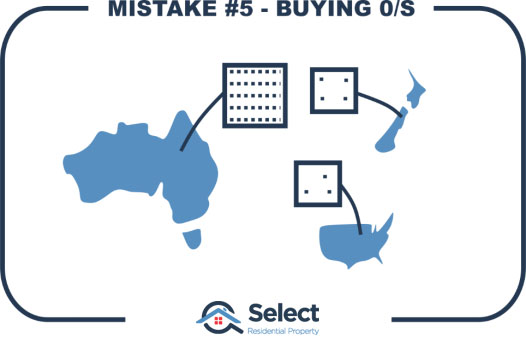
If it took years to become a decent investor in Australia, I should not expect to be an expert in only a few months for an overseas market.
“If you’re going to invest O/S, start your learning all over again before making a purchase”
Mistake 6 – more creative finance
When one lender said “no”, I’d look for an alternative. I refused to take “no” for an answer. It led to some creative financing which led to increased risk. Not worth the hassle.
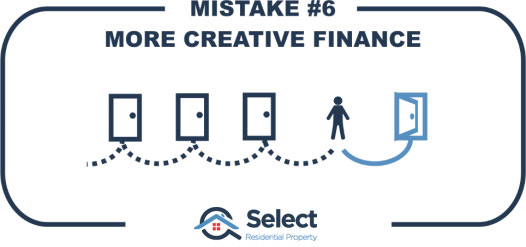
When one lender says “no”, maybe get a second opinion. But if your second opinion is another “no”, perhaps it’s time to sort out your budget rather than try a third lender.
“When the banks say no, take the hint”
Mistake 7 – renovations
After my second renovation, I never wanted to do another one again. I said the same after the 2nd, 3rd and 4th. After both the 5th and 6th, I promised myself I’d never do another one ever again. I’ve done about 10 now. Admittedly, the last half a dozen or so weren’t hands-on. I didn’t lift a finger. But they were still annoying.
DIY renovations are like having a second job. But project delays are now your financial problem rather than your boss’s. If the project is a failure, you bear the brunt of it.
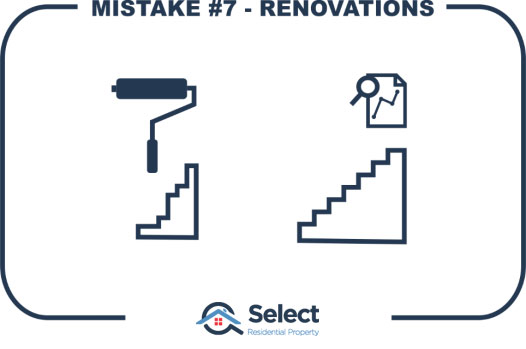
I found them to be extremely time-consuming and yet not delivering enough in value gain. Now days a little effort researching growth markets delivers much bigger gains for a lot less effort even if those gains do take some time to play out.
“The idea of passive wealth creation is to sit on your hands, not soil them”
Mistake 8 – joint ventures
I wasted 3 years of my life working for free on a joint venture in a property investment business. It wasn’t until money started rolling in that I discovered I had no ownership, no say in the dodgy practices and a pittance share in any earnings. I left and started DSR Data on my own.
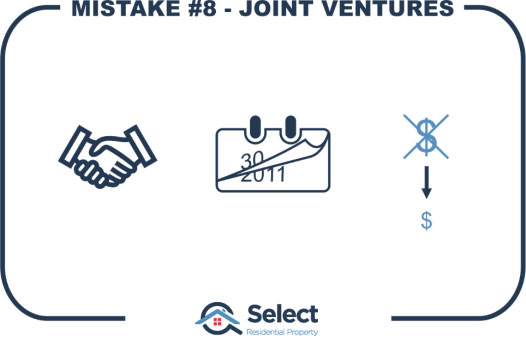
There was no formal written agreement and no clear exit strategy. That was one mistake. But I think my greater mistake was partnering with a “snake charming talker”. Their weapon is their tongue, while it’s wagging, they’re in control.
“Some ‘do’. Some ‘talk’. Talk to the doers and walk from the talkers.”
Mistake 9 – cross collateralising
I already heard of this problem.
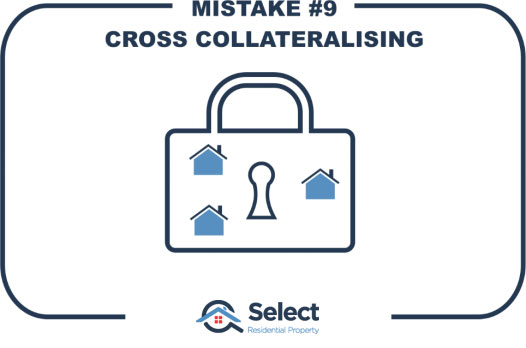
I was well aware of the issues. But I thought I had found a unique case in which it made perfect sense. And it did – at the time. But in the long run it burned me.
“Don’t cross collateralise. Except when … no, just don’t cross collateralise.”
Mistake 10 – showing leniency towards tenants
I don’t consider myself to be a truly caring soul. But there are times when my heart goes out to complete strangers and I want to help. Unfortunately, there are plenty of these strangers that are just stringing you along.
A tenant had fallen on hard times and they knew the property manager personally. The property manager recommended I give them a little more time to pay their rent. I did. And I did again, and again. Eventually the tenant did the fly by night with big arrears and damage to my property thrown in.
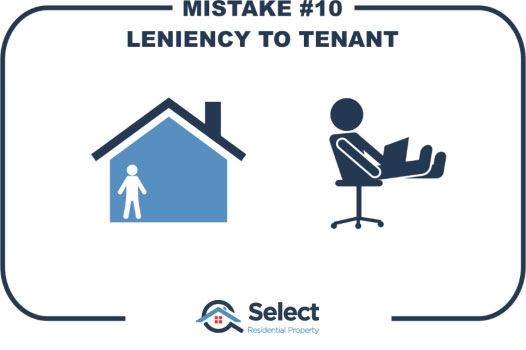
The insurer refused to pay. It was not my call to show leniency at the insurer’s expense. Lesson learned. Now I just execute programmatically like the insurer would. No more dodgy tenants or property managers will take me for a ride.
“Be like your insurer – show tenants fine-print, not mercy”
Mistake 11 – low cash reserves
For every property you acquire, there needs to be some cash reserves held aside for emergencies. The longer you hold the property, the more likely something will go bung. You need to be ready for it. Eventually, you’ll have a renovation opportunity. That’s great since you can add value. But you need the funds set aside. This gets harder and harder as your portfolio grows.
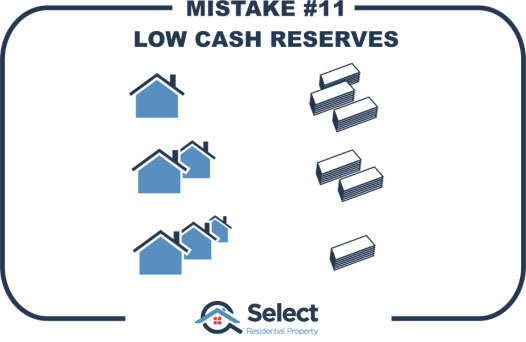
I’ve always tried to get everything fixed as soon as a tenant complains. But there were some cases where I was so low on cash, I had to put off major rectifications. I didn’t deserve to be a landlord. Make sure you can easily afford to maintain your property and keep plenty of cash in reserve.
“Tenants are your customers; give them the service you’d expect as a customer”
Mistake 12 – job security
You need to factor in a period of time where you may be without work. Businesses can fold; jobs can be lost; contracts broken; and pay cuts implemented. You must have sufficient cash reserves for a prolonged period of unemployment.
I was doing contract work as a computer programmer once when a project I was working on was cut short and my contract was terminated.
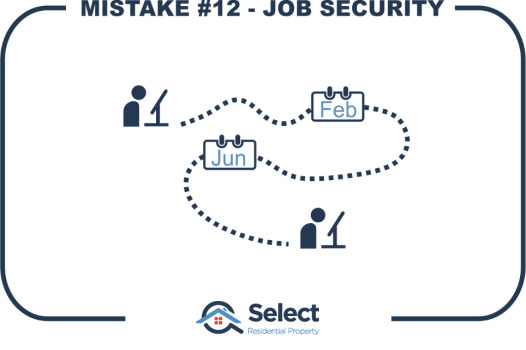
At the time there was a slump in the I.T. sector and it wasn’t as easy as I thought to find another contract. During that time of desperately seeking, I was burning cash very quickly via a negatively geared portfolio.
“The larger your portfolio, the bigger your cash buffer needs to be”
Summary
- Never say “never sell”, there may be a time when you’ll be better off
- Pick a loan you can easily replace if your lender turns ugly
- Good finance doesn’t make for a good investment, it’s only a lever
- Research the tenant if the property you’re buying comes with one fitted
- If buying O/S, re-learn everything & make sure you’ll have excellent intel
- When the banks so “no”, take the hint
- Renos may deliver bigger gains than a part-time job, but come with higher risk
- Don’t JV with “talkers”, have very clear terms, especially the exit
- Don’t cross-collateralise. Unless … no, just don’t cross-collateralise
- Contribute to the charity of your choice, but act like your insurer would to tenants
- Always have repairs & maintenance money ready for when things go bung
- Ensure you have cash reserves that match your portfolio size, jobs don’t last forever
Conclusion
Don’t get too aggressive with your wealth accumulation. Have fall backs and margins-for-error. Life here in the lucky country doesn’t throw daggers at us frequently enough, so we get complacent in good times. Be prepared for bad times, if you can endure them, you’re bound to be a successful property investor eventually.


